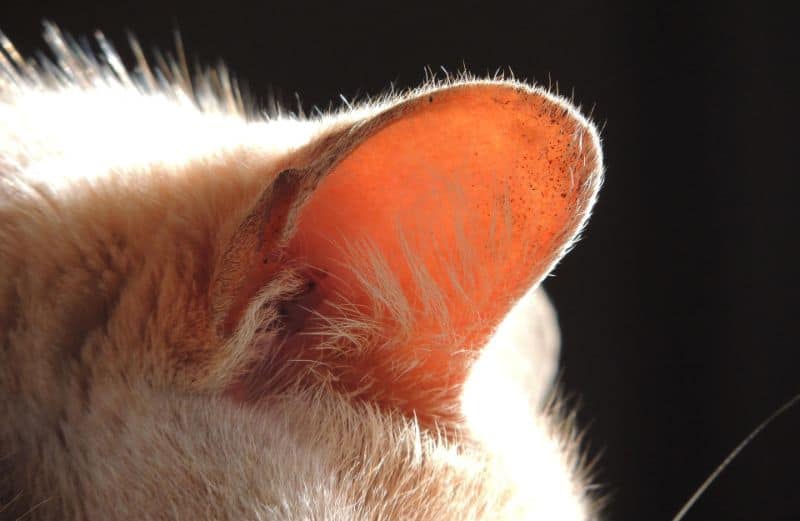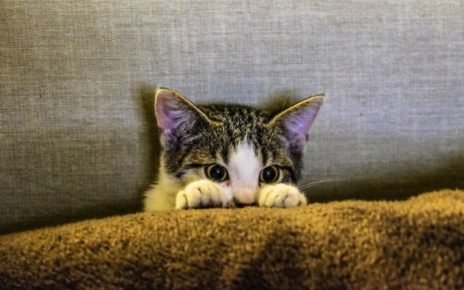Since cats groom themselves so often, it’s easy to forget that they still need some help staying clean. One spot you might not think to clean is your cat’s ears. However, veterinarians typically recommend that cats have their ears cleaned at least once a month.
In this article, we will discuss why it is important to clean your cat’s ears and how to properly clean them.
Should I Clean My Cat’s Ears
If your cat’s ears appear dirty or are releasing an excessive amount of wax, it is probably time to clean them. If you notice any redness or swelling in your cat’s ears, there may be an infection present, and you should take your cat to a vet for treatment.
Cleaning your cat’s ears at home is relatively simple and can be done using a cotton ball dipped in warm water or a commercially available pet ear cleaning solution. Gently wipe the inside of the ear, taking care not to damage the delicate skin.
How Often Should I Clean My Cat’s Ears
You should clean your cat’s ears every 2 to 4 weeks, depending on how dirty they get. However, if you notice any discharge or build-up in their ears, you should clean them more frequently. Additionally, if your cat experiences any itching or discomfort in their ears, they may need to be cleaned more often as well.
Can You Clean a Cat’s Ears with a Q Tip
You should never clean a cat’s ears with a Q-Tip. The Q-Tip can damage the delicate ear canal and push wax and other debris further into the ear, causing impaction or infection. A better way to clean your cat’s ears is to moisten a cotton ball with warm water and wipe it around the inside of the ear canal. You can also use a gentle pet ear cleaner formulated for cats.
What Can Be Used to Clean Cat’s Ears Naturally
There are a number of different natural products that can be used to clean a cat’s ears, but not all of them are created equal. Fortunately, there are a number of ways to clean a cat’s ears, both naturally and with store-bought products.
Coconut oil is a popular natural method of cleaning a cat’s ears. The oil helps to break down wax buildup and keep the ears free of debris.
Hydrogen peroxide is another effective option, as it helps to dissolve earwax and prevent infection.
For a more gentle solution, water or mineral oil can be used to flush out the ear canal. If earwax is particularly stubborn, rubbing alcohol can help to break it down.
Finally, apple cider vinegar can be used to help restore the natural pH balance of the ears.
Whichever method you choose, regular cleaning will help to keep your cat’s ears healthy and free of debris.
Clean Cat Ears with Water
One of the simplest methods to clean a cat’s ears is to use a cotton ball soaked in water. Gently wipe the inside of your cat’s ear, being careful not to go too deep, and be sure to dry their ear out afterward so that your cat doesn’t end up with an ear full of water.
Clean Cat Ears with Hydrogen Peroxide
Just like humans, cats need to have their ears cleaned on a regular basis. Wax and dirt can build up over time, causing irritation and even infection. While there are many commercial ear cleaners available, it’s also possible to clean your cat’s ears using hydrogen peroxide. Simply mix equal parts hydrogen peroxide and water, and then use a cotton ball to gently wipe away any wax or dirt. Be sure to avoid the delicate inner ear, and don’t use hydrogen peroxide if it causes your cat any discomfort.
Clean Cat Ears with Alcohol
Alcohol is a naturally occurring substance that has been used for centuries as a cleaning agent. It is also effective at dissolving earwax build-up, making it an excellent choice for cleaning your cat’s ears. Simply apply a small amount of alcohol to a cotton ball and gently wipe the inside of your cat’s ear. Be careful not to go too deep, as this could damage the delicate tissue. Once you have finished cleaning, allow the alcohol to evaporate completely before letting your cat loose. Regular cleaning will help to keep your cat’s ears healthy and free from infection.
Clean Cat Ears with Coconut Oil
Coconut oil is an all-natural remedy for many cat health problems, including ear infections. The antifungal and antibacterial properties of coconut oil help to kill the bacteria that cause ear infections. In addition, coconut oil helps to soothe itchiness and inflammation. To clean your cat’s ears with coconut oil, simply apply a small amount of oil to a cotton ball and wipe the inside of the ear. You can also add a few drops of coconut oil to your cat’s food to help prevent dry skin, redness, and irritation.
How To Clean Cat Ears with Mites
While there are a number of different ear problems that can affect cats, ear mites are one of the most common. These tiny parasites live inside the ear canal and feed on the wax and oil that is produced by the skin.
Ear mites can cause your cat a great deal of discomfort, and if left untreated, they can lead to serious health problems. The good news is that cat ear mites are relatively easy to treat.
Medicated ear treatments can be used to quickly and effectively remove ear mites from your cat’s ears.
In addition, because ear mites are highly contagious, it is important to treat all of the cats in your household if one is found to be infected.
With prompt treatment, your cat will soon be free of ear mites and back to his or her usual self.
What are the Benefits of Cleaning your Cat’s Ears
Any cat owner knows that cleaning their cat’s ears is not the most fun task. However, it is important to do this on a regular basis in order to maintain their health. Here are just a few of the benefits of keeping your cat’s ears clean:
Prevent Ear Mites: Ear mites are tiny parasites that live in the ear canal and feed on wax and oil. They can cause irritation, inflammation, and even permanent damage to the ear if left untreated. Regular cleaning can help to remove ear mites and prevent them from coming back.
Reduce Odor: Earwax and oil can build up over time, causing an unpleasant odor. Cleaning your cat’s ears regularly will help to keep them smelling fresh and clean.
Prevent Infection: If earwax and oil are not removed, they can create a perfect environment for bacteria to grow. This can lead to an ear infection, which can be painful and even dangerous for your cat.
What To Do If Your Cat Resists Having Their Ears Cleaned
Anyone who has ever tried to clean their cat’s ears knows that it can be a challenge. Cats are notoriously resistant to having their ears cleaned, and even the most patient owner can find themselves at wit’s end.
If your cat is resisting having its ears cleaned, there are a few things you can do to make the process go more smoothly. First, it’s important to use the right ear cleaner. Look for an ear cleaner that is specifically designed for use on cats, and avoid anything that contains alcohol or other harsh chemicals.
Next, put some of the cleaner on a cotton ball and gently wipe the inside of your cat’s ear. Be sure to stop if your cat shows any signs of discomfort. Finally, give your cat a treat as a reward for being such a good sport. With a little patience and perseverance, you should be able to get your cat’s ears nice and clean.





